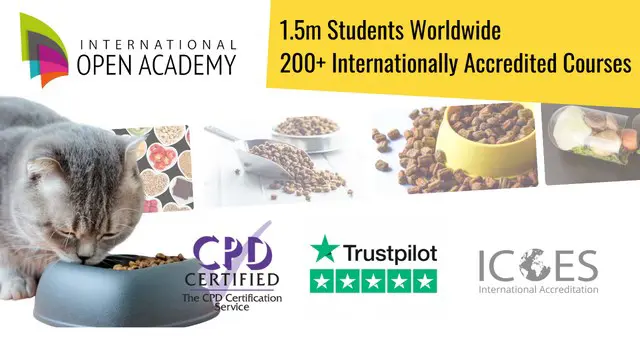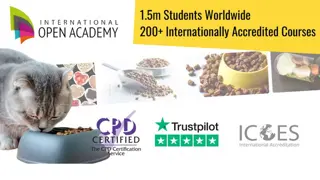
Accreditted Pet Nutrition Course
CPD UK Certified | ICOES International Accreditation | 30 CPD Points | Certification Available| Free Retake Exam
International Open Academy
Summary
- Exam(s) / assessment(s) is included in price
Add to basket or enquire
Overview
As the saying goes, “You are what you eat.” This is as true for our pets as it is for us. But with so many different diets and formulations on the shelves, the world of pet food may seem baffling and overwhelming.
This highly digestible course will help you understand your pet’s dietary needs and give a solid grounding in pet nutrition. The course helps you understand food labelling, how much and when to feed, and not forgetting our smaller furry (and scaly) friends as we pick a path through the maze of pet nutrition.
Food glorious food! You’re on safe ground spotting a steak is not a cabbage, but can you tell proteins, carbohydrates and fats from vitamins, minerals, and antioxidants? Learn nutritional aspects such as:
- Food groups: What foods are made up of
- Types of food: How commercial diets are packaged
- Food labelling: Decode the small print
- Know how much to feed
KEY COURSE BENEFITS:
• 60-Day access – Study at your own pace
• Internationally-recognized CPD accredited course
• Start learning straightaway from any laptop or mobile device in any country
Understand Your Pet’s Nutritional Needs
A dog has different nutritional needs to a cat, which is different to a rabbit. Indeed, don’t stop there because birds, fish, and reptiles all have specific needs. Learn about:
- Different types of digestion: Herbivores, carnivores, and omnivores
- Life stage feeding: Youngster, adult, or senior pet
- Matching lifestyle to nutrition: How to feed the active animal, for pregnancy or lactation
- Why a cat isn’t a small dog
- Mealtimes vs ad lib feeding
- Avoiding fussy eaters
The Weighty Matter of Weight
It’s official: Lean animals live longer.
Learn how to assess your pet’s weight and then diet them for longer life:
- Body score your pet
- Feeding for painless weight loss
- What every overweight diabetic cat should know
Food and Ill Health
Food choices cut both ways: It causes ill health and it can cure it. Learn:
- Signs of dietary allergy or food intolerance
- How to put your pet on a hypoallergenic diet
- Foods to improve renal, liver, heart, dental, and urinary disease
An appropriate, good quality diet is vital for our pets’ health and longevity but do you truly what you’re feeding them? If you can’t put your hand on your heart and say “Yes,” then this course helps you to ask, and answer, the right questions about feeding.
CPD
Course media
Description
Learn how to switch diets without upsetting your pet’s tummy, and weigh up the pros and cons of various diets such as:
- Raw meaty bones
- A homemade diet
- Supermarket food
- Veterinary approved diets
- Prescription diets
Learn the crucial importance of an unprocessed high fiber diet to your rabbit’s health and well-being. Also, how to feed the following for optimal health:
- Rabbits
- Guinea pigs
- Hamsters, gerbils, rats, and mice
- Birds,
- Fish
- Tortoises, turtles, and terrapins
- Reptiles, including snakes.
How is the Animal Nutrition course assessed?
There is a short multiple choice exam at the end of each module for you to take and you’ll know your score immediately.
By studying Animal Nutrition online with IOA, you do not pay an extra fee for sitting an exam or have to wait for a set date to sit an exam.
Pet Nutrition Course Syllabus:
Module 1: Food Glorious Food
- 1.1 Food groups
- 1.2 Types of diet
- 1.3 Reading food labels
Module 2: Types of Digestion
- 2.1 Herbivores
- 2.2 Carnivores
- 2.3 Omnivores
Module 3: Cradle to Grave Feeding
- 3.1 Puppies and Kittens
- 3.2 Adults
- 3.3 The senior animal
- 3.4 Pregnancy and lactation
- 3.5 Feeding Dogs
- 3.6 Feeding Cats
- 3.7 Ad lib feeding vs mealtimes
- 3.8 How often to feed
- 3.9 Avoiding faddy eaters
Module 4: The Weighty Matter of Weight
- 4.1 The importance of a healthy waistline
- 4.2 Does your pet have a weight problem?
- 4.3 Honey I shrunk the dog
- 4.4 A special mention about cats and diabetes
- 4.5 Safe weight gain
Module 5: Food and Ill Health
- 5.1 Dietary allergies and intolerance
- 5.2 Hypoallergenic diets
- 5.3 Cats and Urinary Blockages
- 5.4 Renal problems
- 5.5 GI upsets
- 5.6 Pancreatitis
- 5.7 Dental disease
- 5.8 Cancer, brain ageing, and liver disease
Module 6: Pet Food
- 6.1 Homemade diets
- 6.2 RMB
- 6.3 Supermarket foods
- 6.4 Premium pet foods
- 6.5 Veterinary approved foods
- 6.6 Changing diets
Module 7: Rabbits and Guinea Pigs
- 7.1 Myths and mistakes
- 7.2 Healthy Eating for Rabbits and Guinea Pigs
- 7.3 Eating Related Issues
Module 8: Mice, Rats, Gerbils, and Hamsters
- 8.1 Mice and rats
- 8.2 Gerbils
- 8.3 Hamsters
Module 9: Birds
- 9.1 Cage birds
- 9.2 Poultry
- 9.3 Birds of Prey
- 9.4 Parrots
Module 10: Fish
- 10.1 Freshwater
- 10.2 Marine
- 10.3 Saltwater
Module 11: Reptiles
- 11.1 Tortoises
- 11.2 Terrapins and Turtles
- 11.3 Lizards
- 11.4 Snakes
Who is this course for?
This course will be of great interest to animal lovers and professionals in the pet care industry who would like to better understand the nutritional needs of animals, how to properly care for pets, and to any learner who is interested in pet care as a future industry to work in.
This is also a great resource for those who would like to own animals and want to provide the highest level of care for their pets.
Requirements
This Pet Nutrition course is open to all, with no formal entry requirements.
Career path
Candidates with an interest in working with animals
Anyone interested in a career in animal nutrition or animal care
Those interested in owning animals, volunteering at animal shelters, or fostering animals.
Existing animal care workers in pursuit of promotion
Those seeking to improve the lives of their pets through proper nutritional care
Questions and answers
I have dyslexia would this be a problem. Or is there anything in place to help
Answer:You can absolutely study the course and dyslexia will not be a problem. All exam tasks are multiple choice questions and designed to help you organise the knowledge. You also have unlimited study time.
This was helpful.once paid for the course how would we access the materials and online course. is it sent in an email or log in?
Answer:There's no time limit for completing the course since you have lifetime access to the Pet Nutrition course content. Once you complete your purchase you will be contacted with all the relevant information by email.
This was helpful.
Reviews
Legal information
This course is advertised on reed.co.uk by the Course Provider, whose terms and conditions apply. Purchases are made directly from the Course Provider, and as such, content and materials are supplied by the Course Provider directly. Reed is acting as agent and not reseller in relation to this course. Reed's only responsibility is to facilitate your payment for the course. It is your responsibility to review and agree to the Course Provider's terms and conditions and satisfy yourself as to the suitability of the course you intend to purchase. Reed will not have any responsibility for the content of the course and/or associated materials.




